Literature Review: Fair Value Accounting in Corporate Reporting
VerifiedAdded on 2023/06/10
|20
|5333
|270
Literature Review
AI Summary
This paper provides a literature review on fair value accounting, a controversial topic in corporate reporting. It examines the evolution of fair value measurement, its rationale, and the factors considered in its application, including techniques for fair value assessment and complexities in accounting policies. The review addresses the debate surrounding the impact of fair value accounting on the reliability and relevance of financial information, referencing key academic journals and accounting standards like IFRS 13. It also discusses recent opposition to fair value accounting and its potential to exacerbate financial crises, concluding with an overview of the challenges and implications for financial statement users. Desklib offers more solved assignments and resources for students.
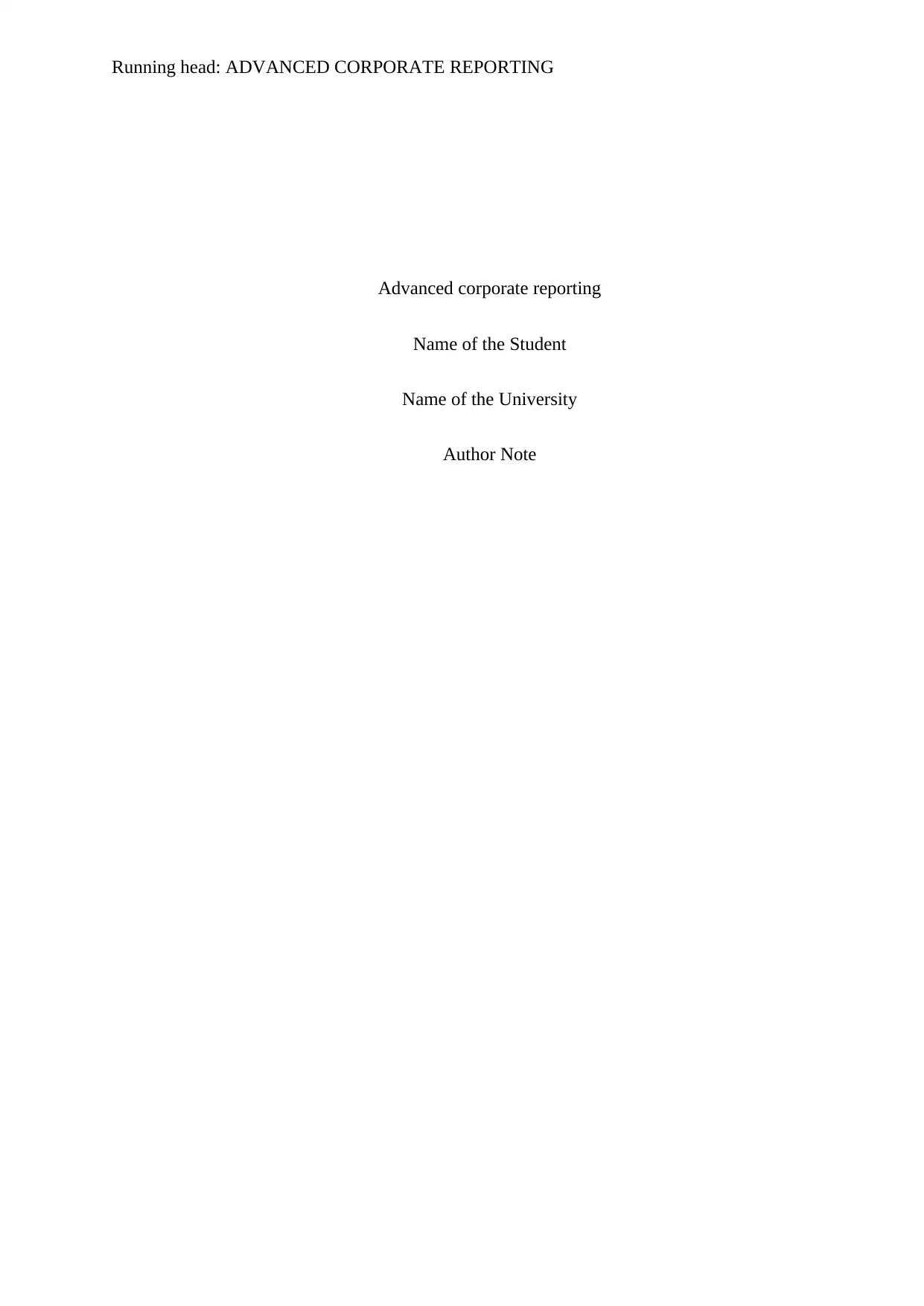
Running head: ADVANCED CORPORATE REPORTING
Advanced corporate reporting
Name of the Student
Name of the University
Author Note
Advanced corporate reporting
Name of the Student
Name of the University
Author Note
Paraphrase This Document
Need a fresh take? Get an instant paraphrase of this document with our AI Paraphraser
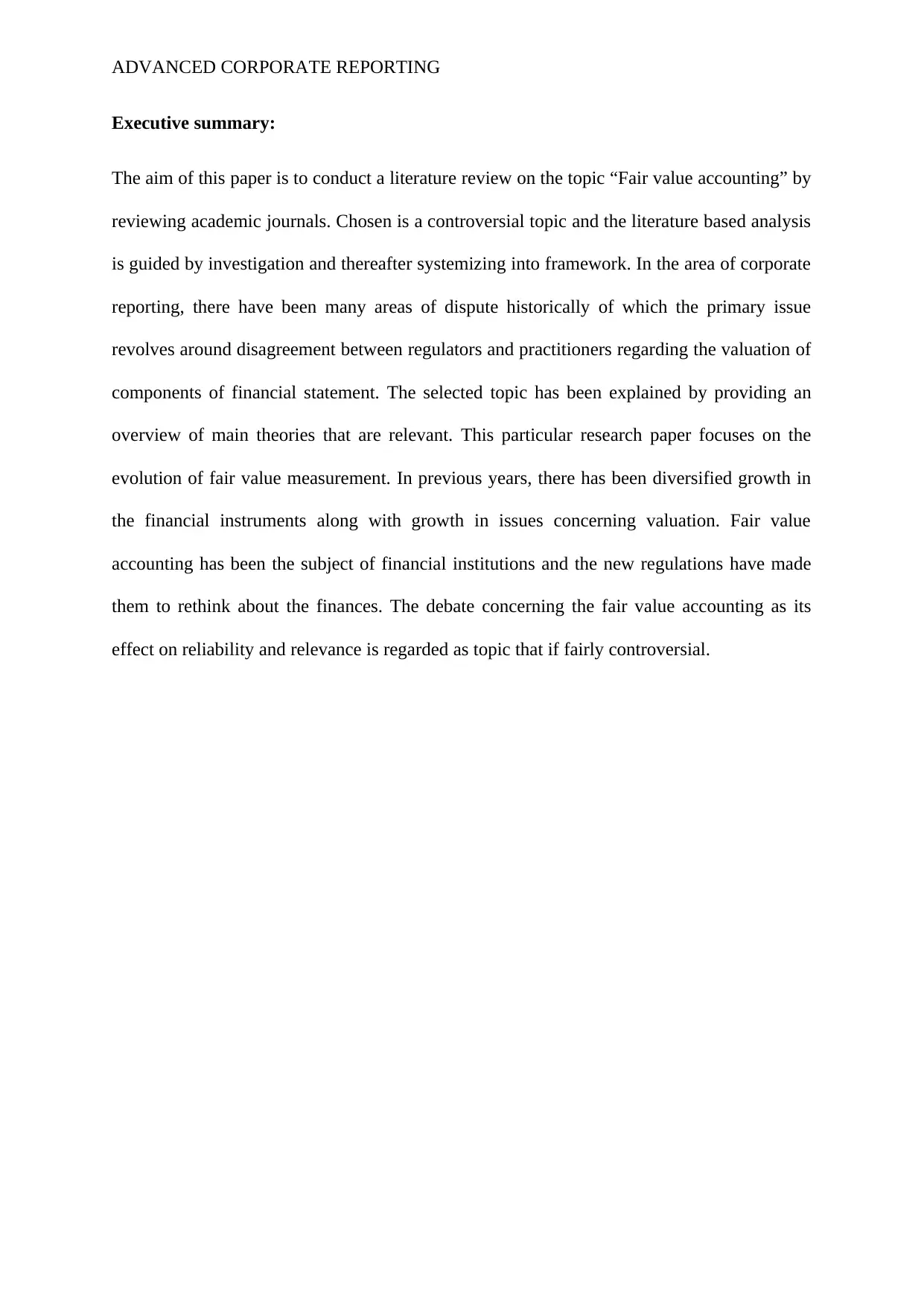
ADVANCED CORPORATE REPORTING
Executive summary:
The aim of this paper is to conduct a literature review on the topic “Fair value accounting” by
reviewing academic journals. Chosen is a controversial topic and the literature based analysis
is guided by investigation and thereafter systemizing into framework. In the area of corporate
reporting, there have been many areas of dispute historically of which the primary issue
revolves around disagreement between regulators and practitioners regarding the valuation of
components of financial statement. The selected topic has been explained by providing an
overview of main theories that are relevant. This particular research paper focuses on the
evolution of fair value measurement. In previous years, there has been diversified growth in
the financial instruments along with growth in issues concerning valuation. Fair value
accounting has been the subject of financial institutions and the new regulations have made
them to rethink about the finances. The debate concerning the fair value accounting as its
effect on reliability and relevance is regarded as topic that if fairly controversial.
Executive summary:
The aim of this paper is to conduct a literature review on the topic “Fair value accounting” by
reviewing academic journals. Chosen is a controversial topic and the literature based analysis
is guided by investigation and thereafter systemizing into framework. In the area of corporate
reporting, there have been many areas of dispute historically of which the primary issue
revolves around disagreement between regulators and practitioners regarding the valuation of
components of financial statement. The selected topic has been explained by providing an
overview of main theories that are relevant. This particular research paper focuses on the
evolution of fair value measurement. In previous years, there has been diversified growth in
the financial instruments along with growth in issues concerning valuation. Fair value
accounting has been the subject of financial institutions and the new regulations have made
them to rethink about the finances. The debate concerning the fair value accounting as its
effect on reliability and relevance is regarded as topic that if fairly controversial.
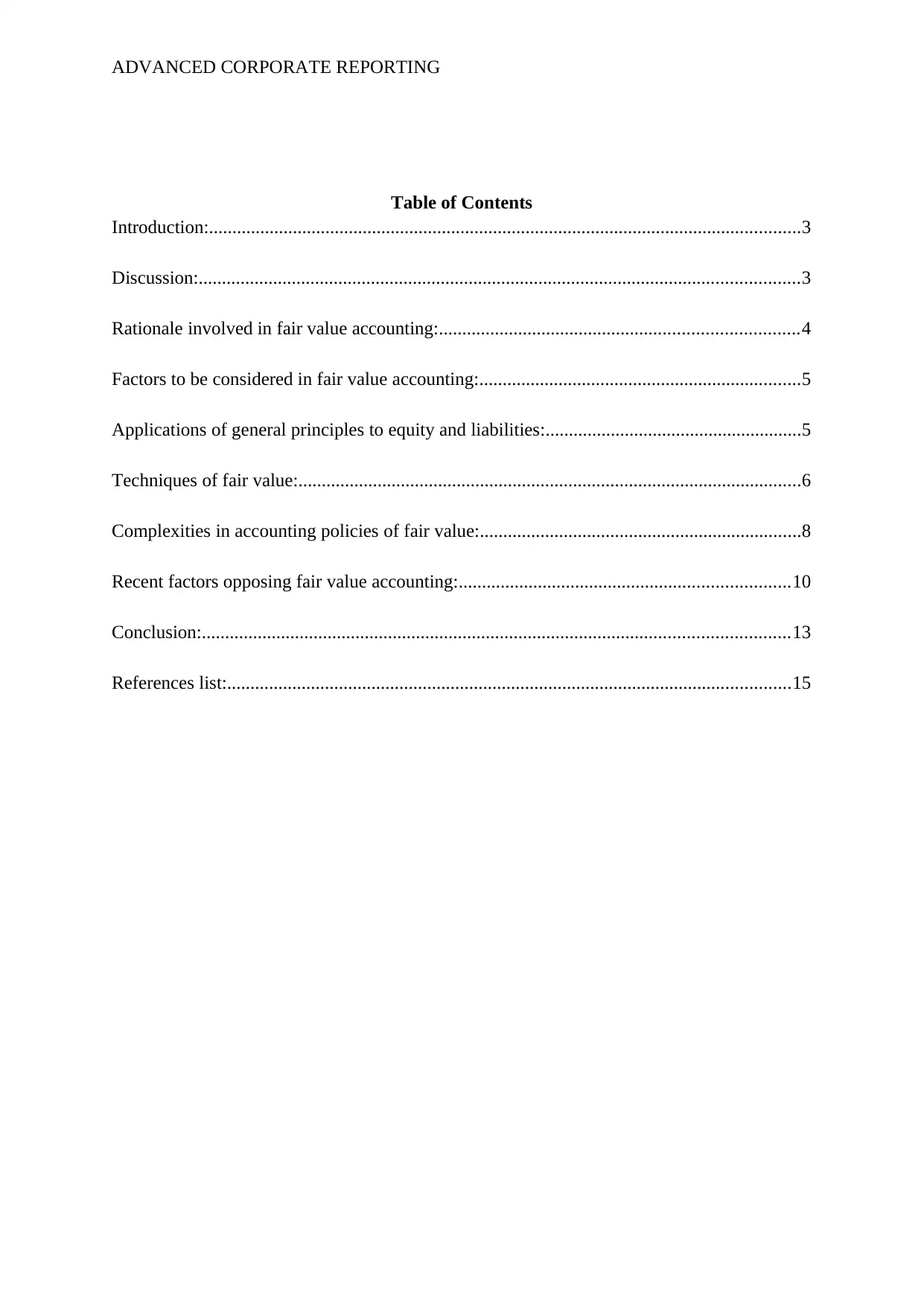
ADVANCED CORPORATE REPORTING
Table of Contents
Introduction:...............................................................................................................................3
Discussion:.................................................................................................................................3
Rationale involved in fair value accounting:.............................................................................4
Factors to be considered in fair value accounting:.....................................................................5
Applications of general principles to equity and liabilities:.......................................................5
Techniques of fair value:............................................................................................................6
Complexities in accounting policies of fair value:.....................................................................8
Recent factors opposing fair value accounting:.......................................................................10
Conclusion:..............................................................................................................................13
References list:.........................................................................................................................15
Table of Contents
Introduction:...............................................................................................................................3
Discussion:.................................................................................................................................3
Rationale involved in fair value accounting:.............................................................................4
Factors to be considered in fair value accounting:.....................................................................5
Applications of general principles to equity and liabilities:.......................................................5
Techniques of fair value:............................................................................................................6
Complexities in accounting policies of fair value:.....................................................................8
Recent factors opposing fair value accounting:.......................................................................10
Conclusion:..............................................................................................................................13
References list:.........................................................................................................................15
⊘ This is a preview!⊘
Do you want full access?
Subscribe today to unlock all pages.

Trusted by 1+ million students worldwide
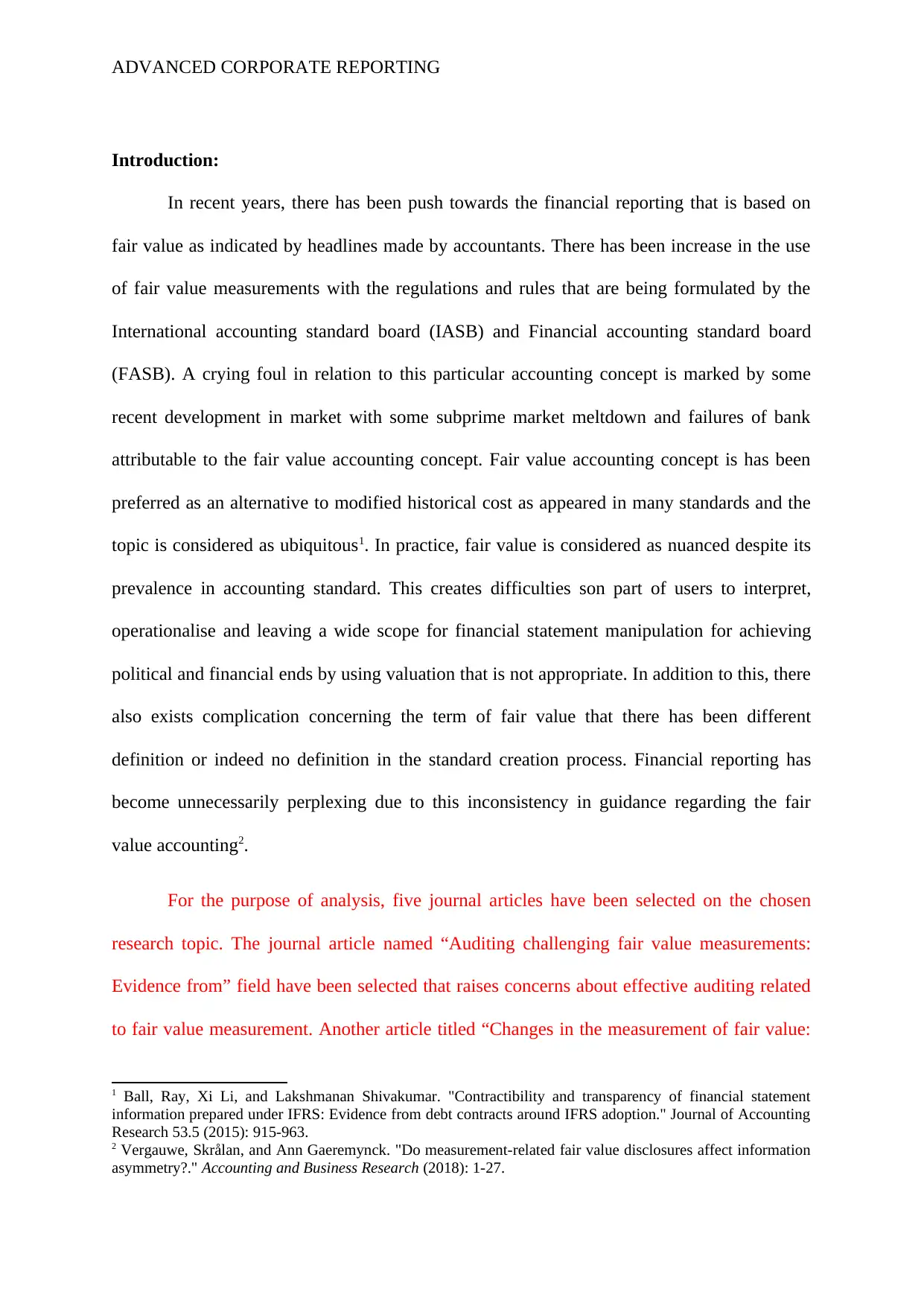
ADVANCED CORPORATE REPORTING
Introduction:
In recent years, there has been push towards the financial reporting that is based on
fair value as indicated by headlines made by accountants. There has been increase in the use
of fair value measurements with the regulations and rules that are being formulated by the
International accounting standard board (IASB) and Financial accounting standard board
(FASB). A crying foul in relation to this particular accounting concept is marked by some
recent development in market with some subprime market meltdown and failures of bank
attributable to the fair value accounting concept. Fair value accounting concept is has been
preferred as an alternative to modified historical cost as appeared in many standards and the
topic is considered as ubiquitous1. In practice, fair value is considered as nuanced despite its
prevalence in accounting standard. This creates difficulties son part of users to interpret,
operationalise and leaving a wide scope for financial statement manipulation for achieving
political and financial ends by using valuation that is not appropriate. In addition to this, there
also exists complication concerning the term of fair value that there has been different
definition or indeed no definition in the standard creation process. Financial reporting has
become unnecessarily perplexing due to this inconsistency in guidance regarding the fair
value accounting2.
For the purpose of analysis, five journal articles have been selected on the chosen
research topic. The journal article named “Auditing challenging fair value measurements:
Evidence from” field have been selected that raises concerns about effective auditing related
to fair value measurement. Another article titled “Changes in the measurement of fair value:
1 Ball, Ray, Xi Li, and Lakshmanan Shivakumar. "Contractibility and transparency of financial statement
information prepared under IFRS: Evidence from debt contracts around IFRS adoption." Journal of Accounting
Research 53.5 (2015): 915-963.
2 Vergauwe, Skrålan, and Ann Gaeremynck. "Do measurement-related fair value disclosures affect information
asymmetry?." Accounting and Business Research (2018): 1-27.
Introduction:
In recent years, there has been push towards the financial reporting that is based on
fair value as indicated by headlines made by accountants. There has been increase in the use
of fair value measurements with the regulations and rules that are being formulated by the
International accounting standard board (IASB) and Financial accounting standard board
(FASB). A crying foul in relation to this particular accounting concept is marked by some
recent development in market with some subprime market meltdown and failures of bank
attributable to the fair value accounting concept. Fair value accounting concept is has been
preferred as an alternative to modified historical cost as appeared in many standards and the
topic is considered as ubiquitous1. In practice, fair value is considered as nuanced despite its
prevalence in accounting standard. This creates difficulties son part of users to interpret,
operationalise and leaving a wide scope for financial statement manipulation for achieving
political and financial ends by using valuation that is not appropriate. In addition to this, there
also exists complication concerning the term of fair value that there has been different
definition or indeed no definition in the standard creation process. Financial reporting has
become unnecessarily perplexing due to this inconsistency in guidance regarding the fair
value accounting2.
For the purpose of analysis, five journal articles have been selected on the chosen
research topic. The journal article named “Auditing challenging fair value measurements:
Evidence from” field have been selected that raises concerns about effective auditing related
to fair value measurement. Another article titled “Changes in the measurement of fair value:
1 Ball, Ray, Xi Li, and Lakshmanan Shivakumar. "Contractibility and transparency of financial statement
information prepared under IFRS: Evidence from debt contracts around IFRS adoption." Journal of Accounting
Research 53.5 (2015): 915-963.
2 Vergauwe, Skrålan, and Ann Gaeremynck. "Do measurement-related fair value disclosures affect information
asymmetry?." Accounting and Business Research (2018): 1-27.
Paraphrase This Document
Need a fresh take? Get an instant paraphrase of this document with our AI Paraphraser
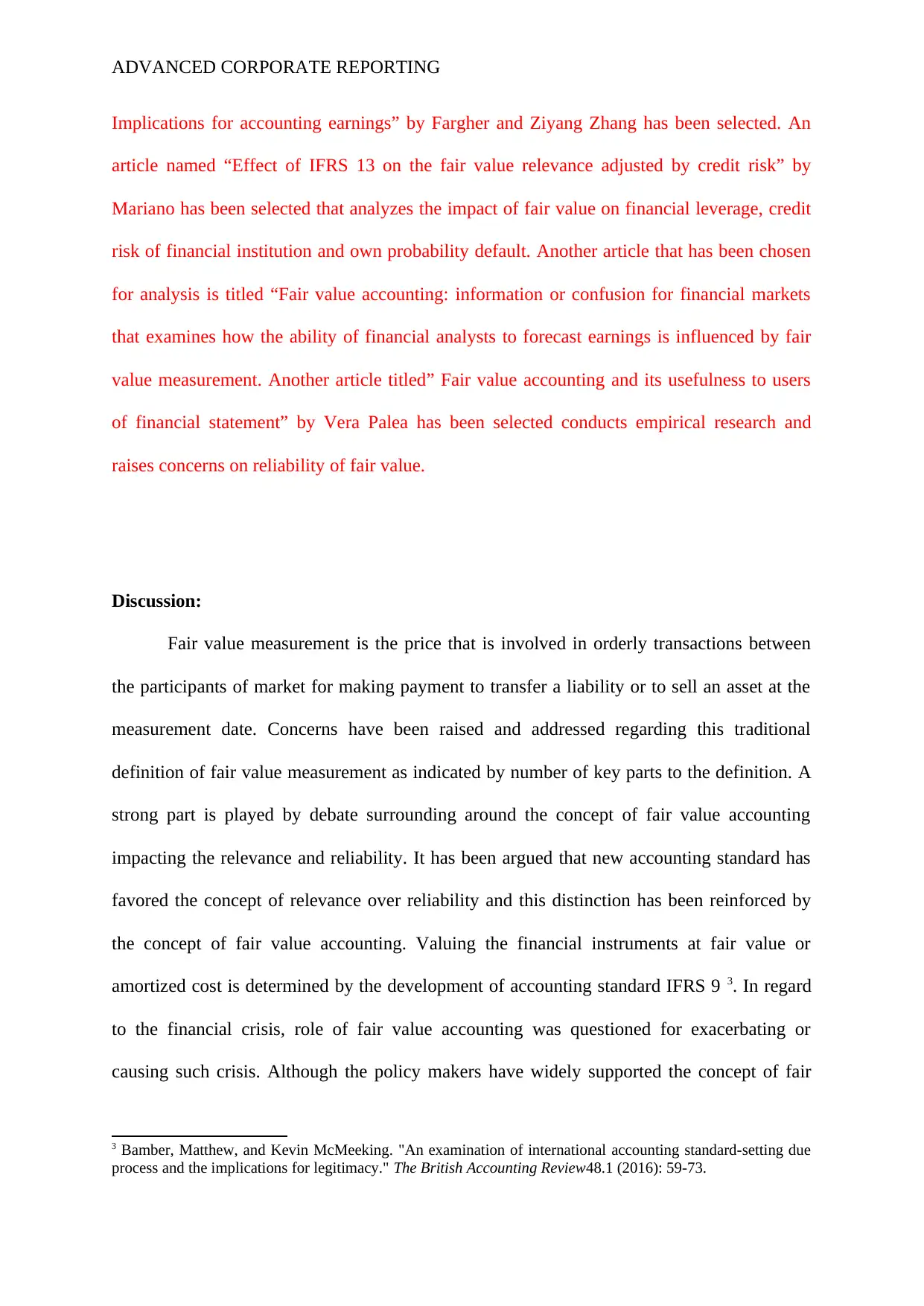
ADVANCED CORPORATE REPORTING
Implications for accounting earnings” by Fargher and Ziyang Zhang has been selected. An
article named “Effect of IFRS 13 on the fair value relevance adjusted by credit risk” by
Mariano has been selected that analyzes the impact of fair value on financial leverage, credit
risk of financial institution and own probability default. Another article that has been chosen
for analysis is titled “Fair value accounting: information or confusion for financial markets
that examines how the ability of financial analysts to forecast earnings is influenced by fair
value measurement. Another article titled” Fair value accounting and its usefulness to users
of financial statement” by Vera Palea has been selected conducts empirical research and
raises concerns on reliability of fair value.
Discussion:
Fair value measurement is the price that is involved in orderly transactions between
the participants of market for making payment to transfer a liability or to sell an asset at the
measurement date. Concerns have been raised and addressed regarding this traditional
definition of fair value measurement as indicated by number of key parts to the definition. A
strong part is played by debate surrounding around the concept of fair value accounting
impacting the relevance and reliability. It has been argued that new accounting standard has
favored the concept of relevance over reliability and this distinction has been reinforced by
the concept of fair value accounting. Valuing the financial instruments at fair value or
amortized cost is determined by the development of accounting standard IFRS 9 3. In regard
to the financial crisis, role of fair value accounting was questioned for exacerbating or
causing such crisis. Although the policy makers have widely supported the concept of fair
3 Bamber, Matthew, and Kevin McMeeking. "An examination of international accounting standard-setting due
process and the implications for legitimacy." The British Accounting Review48.1 (2016): 59-73.
Implications for accounting earnings” by Fargher and Ziyang Zhang has been selected. An
article named “Effect of IFRS 13 on the fair value relevance adjusted by credit risk” by
Mariano has been selected that analyzes the impact of fair value on financial leverage, credit
risk of financial institution and own probability default. Another article that has been chosen
for analysis is titled “Fair value accounting: information or confusion for financial markets
that examines how the ability of financial analysts to forecast earnings is influenced by fair
value measurement. Another article titled” Fair value accounting and its usefulness to users
of financial statement” by Vera Palea has been selected conducts empirical research and
raises concerns on reliability of fair value.
Discussion:
Fair value measurement is the price that is involved in orderly transactions between
the participants of market for making payment to transfer a liability or to sell an asset at the
measurement date. Concerns have been raised and addressed regarding this traditional
definition of fair value measurement as indicated by number of key parts to the definition. A
strong part is played by debate surrounding around the concept of fair value accounting
impacting the relevance and reliability. It has been argued that new accounting standard has
favored the concept of relevance over reliability and this distinction has been reinforced by
the concept of fair value accounting. Valuing the financial instruments at fair value or
amortized cost is determined by the development of accounting standard IFRS 9 3. In regard
to the financial crisis, role of fair value accounting was questioned for exacerbating or
causing such crisis. Although the policy makers have widely supported the concept of fair
3 Bamber, Matthew, and Kevin McMeeking. "An examination of international accounting standard-setting due
process and the implications for legitimacy." The British Accounting Review48.1 (2016): 59-73.
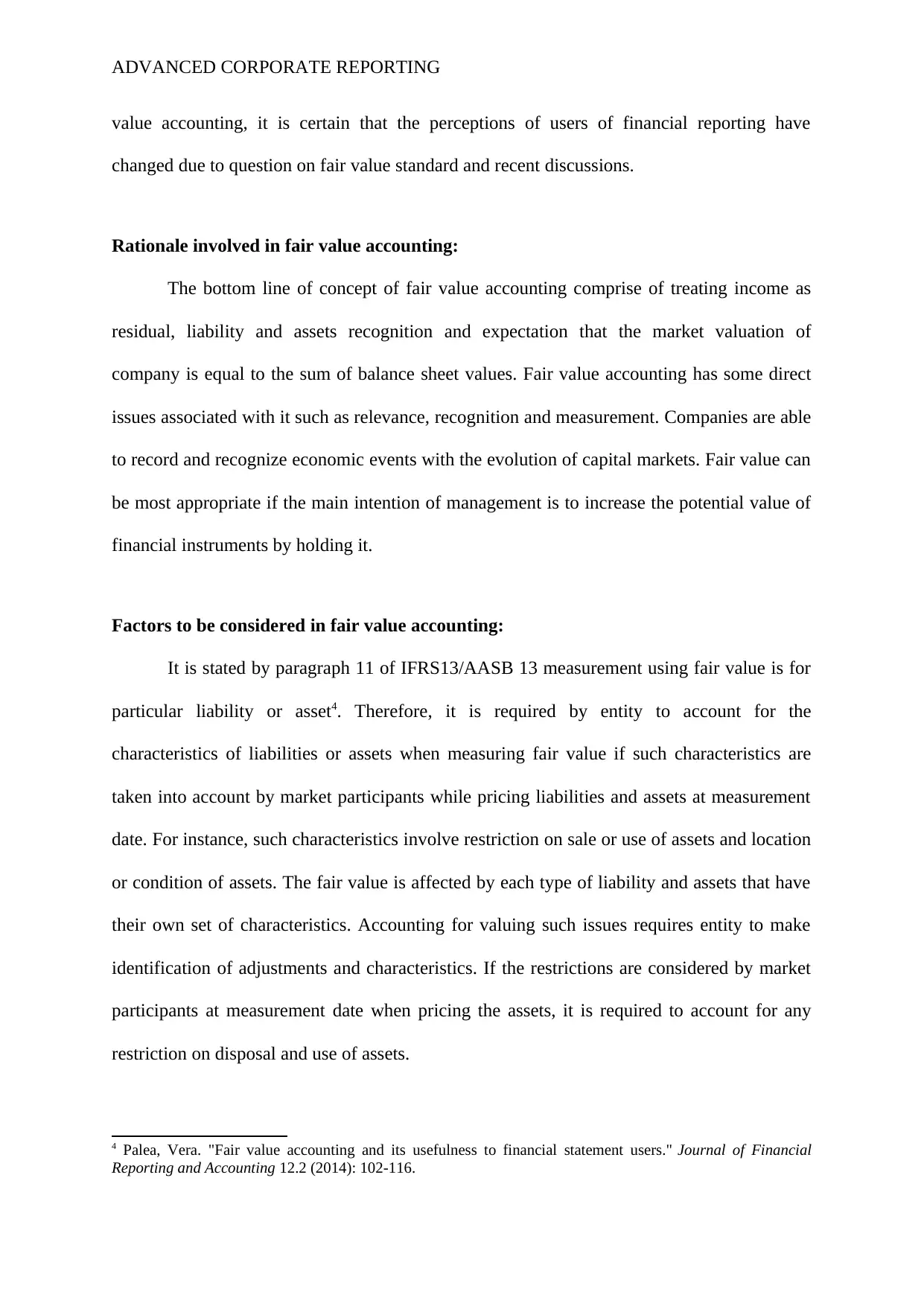
ADVANCED CORPORATE REPORTING
value accounting, it is certain that the perceptions of users of financial reporting have
changed due to question on fair value standard and recent discussions.
Rationale involved in fair value accounting:
The bottom line of concept of fair value accounting comprise of treating income as
residual, liability and assets recognition and expectation that the market valuation of
company is equal to the sum of balance sheet values. Fair value accounting has some direct
issues associated with it such as relevance, recognition and measurement. Companies are able
to record and recognize economic events with the evolution of capital markets. Fair value can
be most appropriate if the main intention of management is to increase the potential value of
financial instruments by holding it.
Factors to be considered in fair value accounting:
It is stated by paragraph 11 of IFRS13/AASB 13 measurement using fair value is for
particular liability or asset4. Therefore, it is required by entity to account for the
characteristics of liabilities or assets when measuring fair value if such characteristics are
taken into account by market participants while pricing liabilities and assets at measurement
date. For instance, such characteristics involve restriction on sale or use of assets and location
or condition of assets. The fair value is affected by each type of liability and assets that have
their own set of characteristics. Accounting for valuing such issues requires entity to make
identification of adjustments and characteristics. If the restrictions are considered by market
participants at measurement date when pricing the assets, it is required to account for any
restriction on disposal and use of assets.
4 Palea, Vera. "Fair value accounting and its usefulness to financial statement users." Journal of Financial
Reporting and Accounting 12.2 (2014): 102-116.
value accounting, it is certain that the perceptions of users of financial reporting have
changed due to question on fair value standard and recent discussions.
Rationale involved in fair value accounting:
The bottom line of concept of fair value accounting comprise of treating income as
residual, liability and assets recognition and expectation that the market valuation of
company is equal to the sum of balance sheet values. Fair value accounting has some direct
issues associated with it such as relevance, recognition and measurement. Companies are able
to record and recognize economic events with the evolution of capital markets. Fair value can
be most appropriate if the main intention of management is to increase the potential value of
financial instruments by holding it.
Factors to be considered in fair value accounting:
It is stated by paragraph 11 of IFRS13/AASB 13 measurement using fair value is for
particular liability or asset4. Therefore, it is required by entity to account for the
characteristics of liabilities or assets when measuring fair value if such characteristics are
taken into account by market participants while pricing liabilities and assets at measurement
date. For instance, such characteristics involve restriction on sale or use of assets and location
or condition of assets. The fair value is affected by each type of liability and assets that have
their own set of characteristics. Accounting for valuing such issues requires entity to make
identification of adjustments and characteristics. If the restrictions are considered by market
participants at measurement date when pricing the assets, it is required to account for any
restriction on disposal and use of assets.
4 Palea, Vera. "Fair value accounting and its usefulness to financial statement users." Journal of Financial
Reporting and Accounting 12.2 (2014): 102-116.
⊘ This is a preview!⊘
Do you want full access?
Subscribe today to unlock all pages.

Trusted by 1+ million students worldwide
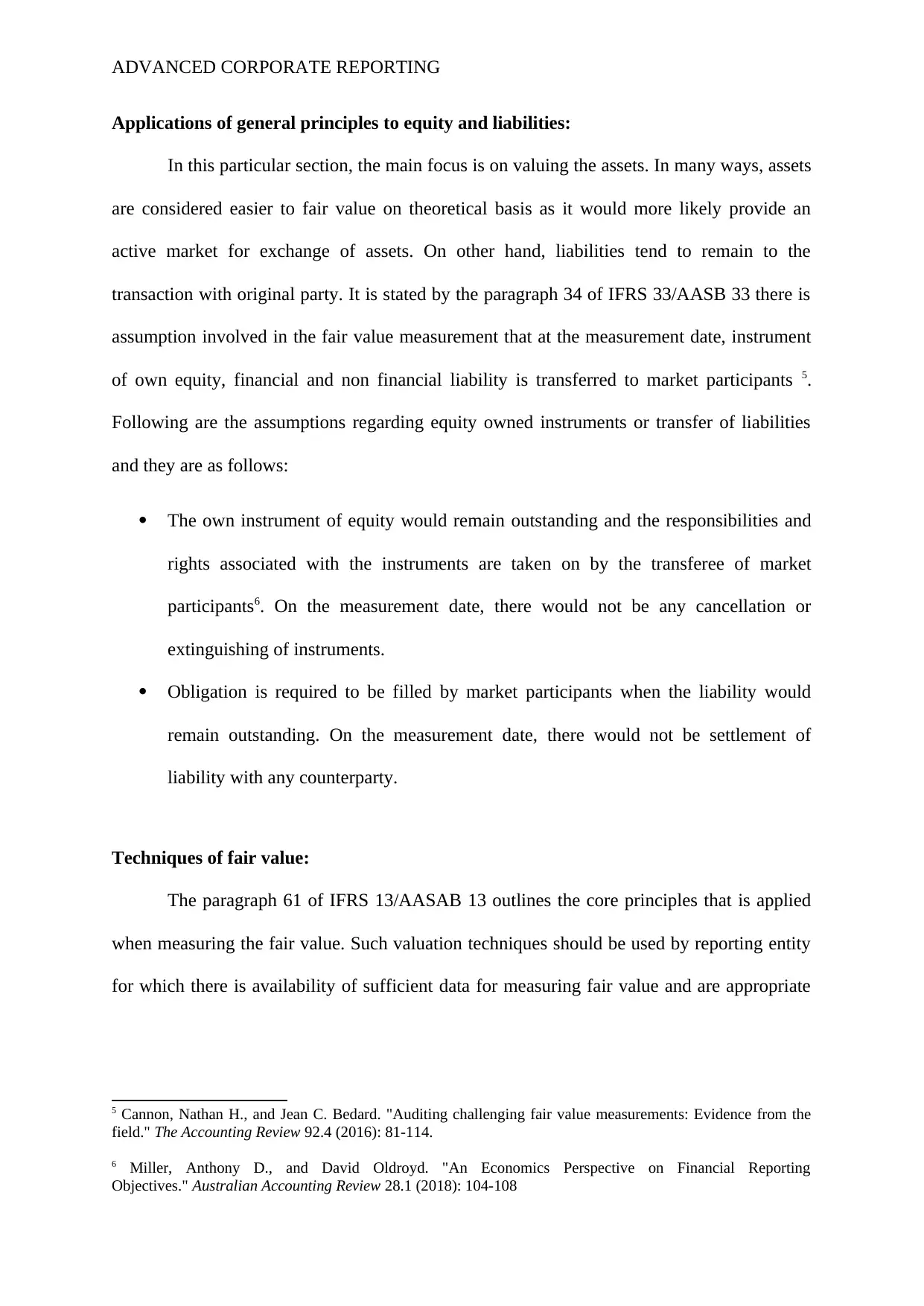
ADVANCED CORPORATE REPORTING
Applications of general principles to equity and liabilities:
In this particular section, the main focus is on valuing the assets. In many ways, assets
are considered easier to fair value on theoretical basis as it would more likely provide an
active market for exchange of assets. On other hand, liabilities tend to remain to the
transaction with original party. It is stated by the paragraph 34 of IFRS 33/AASB 33 there is
assumption involved in the fair value measurement that at the measurement date, instrument
of own equity, financial and non financial liability is transferred to market participants 5.
Following are the assumptions regarding equity owned instruments or transfer of liabilities
and they are as follows:
The own instrument of equity would remain outstanding and the responsibilities and
rights associated with the instruments are taken on by the transferee of market
participants6. On the measurement date, there would not be any cancellation or
extinguishing of instruments.
Obligation is required to be filled by market participants when the liability would
remain outstanding. On the measurement date, there would not be settlement of
liability with any counterparty.
Techniques of fair value:
The paragraph 61 of IFRS 13/AASAB 13 outlines the core principles that is applied
when measuring the fair value. Such valuation techniques should be used by reporting entity
for which there is availability of sufficient data for measuring fair value and are appropriate
5 Cannon, Nathan H., and Jean C. Bedard. "Auditing challenging fair value measurements: Evidence from the
field." The Accounting Review 92.4 (2016): 81-114.
6 Miller, Anthony D., and David Oldroyd. "An Economics Perspective on Financial Reporting
Objectives." Australian Accounting Review 28.1 (2018): 104-108
Applications of general principles to equity and liabilities:
In this particular section, the main focus is on valuing the assets. In many ways, assets
are considered easier to fair value on theoretical basis as it would more likely provide an
active market for exchange of assets. On other hand, liabilities tend to remain to the
transaction with original party. It is stated by the paragraph 34 of IFRS 33/AASB 33 there is
assumption involved in the fair value measurement that at the measurement date, instrument
of own equity, financial and non financial liability is transferred to market participants 5.
Following are the assumptions regarding equity owned instruments or transfer of liabilities
and they are as follows:
The own instrument of equity would remain outstanding and the responsibilities and
rights associated with the instruments are taken on by the transferee of market
participants6. On the measurement date, there would not be any cancellation or
extinguishing of instruments.
Obligation is required to be filled by market participants when the liability would
remain outstanding. On the measurement date, there would not be settlement of
liability with any counterparty.
Techniques of fair value:
The paragraph 61 of IFRS 13/AASAB 13 outlines the core principles that is applied
when measuring the fair value. Such valuation techniques should be used by reporting entity
for which there is availability of sufficient data for measuring fair value and are appropriate
5 Cannon, Nathan H., and Jean C. Bedard. "Auditing challenging fair value measurements: Evidence from the
field." The Accounting Review 92.4 (2016): 81-114.
6 Miller, Anthony D., and David Oldroyd. "An Economics Perspective on Financial Reporting
Objectives." Australian Accounting Review 28.1 (2018): 104-108
Paraphrase This Document
Need a fresh take? Get an instant paraphrase of this document with our AI Paraphraser
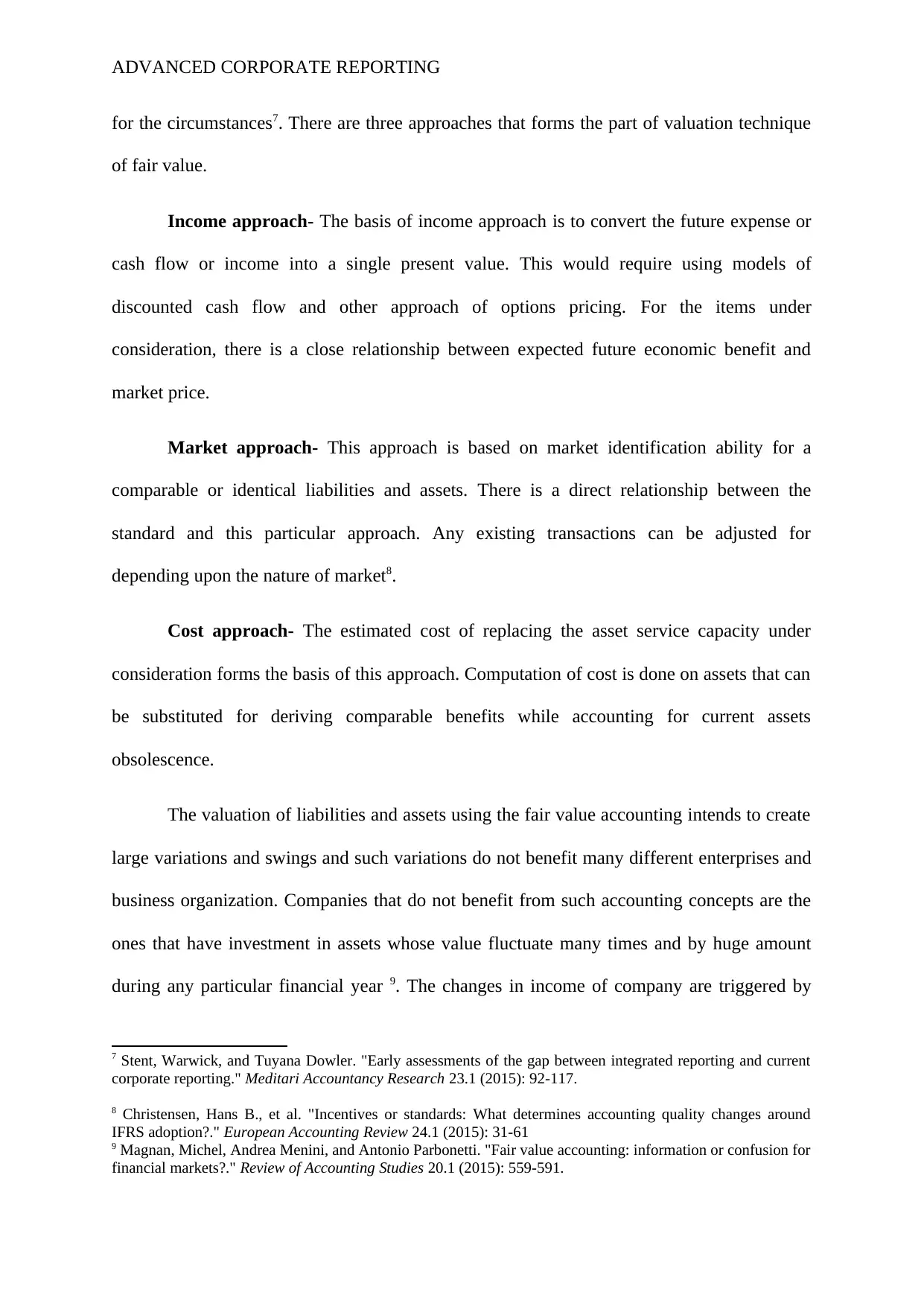
ADVANCED CORPORATE REPORTING
for the circumstances7. There are three approaches that forms the part of valuation technique
of fair value.
Income approach- The basis of income approach is to convert the future expense or
cash flow or income into a single present value. This would require using models of
discounted cash flow and other approach of options pricing. For the items under
consideration, there is a close relationship between expected future economic benefit and
market price.
Market approach- This approach is based on market identification ability for a
comparable or identical liabilities and assets. There is a direct relationship between the
standard and this particular approach. Any existing transactions can be adjusted for
depending upon the nature of market8.
Cost approach- The estimated cost of replacing the asset service capacity under
consideration forms the basis of this approach. Computation of cost is done on assets that can
be substituted for deriving comparable benefits while accounting for current assets
obsolescence.
The valuation of liabilities and assets using the fair value accounting intends to create
large variations and swings and such variations do not benefit many different enterprises and
business organization. Companies that do not benefit from such accounting concepts are the
ones that have investment in assets whose value fluctuate many times and by huge amount
during any particular financial year 9. The changes in income of company are triggered by
7 Stent, Warwick, and Tuyana Dowler. "Early assessments of the gap between integrated reporting and current
corporate reporting." Meditari Accountancy Research 23.1 (2015): 92-117.
8 Christensen, Hans B., et al. "Incentives or standards: What determines accounting quality changes around
IFRS adoption?." European Accounting Review 24.1 (2015): 31-61
9 Magnan, Michel, Andrea Menini, and Antonio Parbonetti. "Fair value accounting: information or confusion for
financial markets?." Review of Accounting Studies 20.1 (2015): 559-591.
for the circumstances7. There are three approaches that forms the part of valuation technique
of fair value.
Income approach- The basis of income approach is to convert the future expense or
cash flow or income into a single present value. This would require using models of
discounted cash flow and other approach of options pricing. For the items under
consideration, there is a close relationship between expected future economic benefit and
market price.
Market approach- This approach is based on market identification ability for a
comparable or identical liabilities and assets. There is a direct relationship between the
standard and this particular approach. Any existing transactions can be adjusted for
depending upon the nature of market8.
Cost approach- The estimated cost of replacing the asset service capacity under
consideration forms the basis of this approach. Computation of cost is done on assets that can
be substituted for deriving comparable benefits while accounting for current assets
obsolescence.
The valuation of liabilities and assets using the fair value accounting intends to create
large variations and swings and such variations do not benefit many different enterprises and
business organization. Companies that do not benefit from such accounting concepts are the
ones that have investment in assets whose value fluctuate many times and by huge amount
during any particular financial year 9. The changes in income of company are triggered by
7 Stent, Warwick, and Tuyana Dowler. "Early assessments of the gap between integrated reporting and current
corporate reporting." Meditari Accountancy Research 23.1 (2015): 92-117.
8 Christensen, Hans B., et al. "Incentives or standards: What determines accounting quality changes around
IFRS adoption?." European Accounting Review 24.1 (2015): 31-61
9 Magnan, Michel, Andrea Menini, and Antonio Parbonetti. "Fair value accounting: information or confusion for
financial markets?." Review of Accounting Studies 20.1 (2015): 559-591.
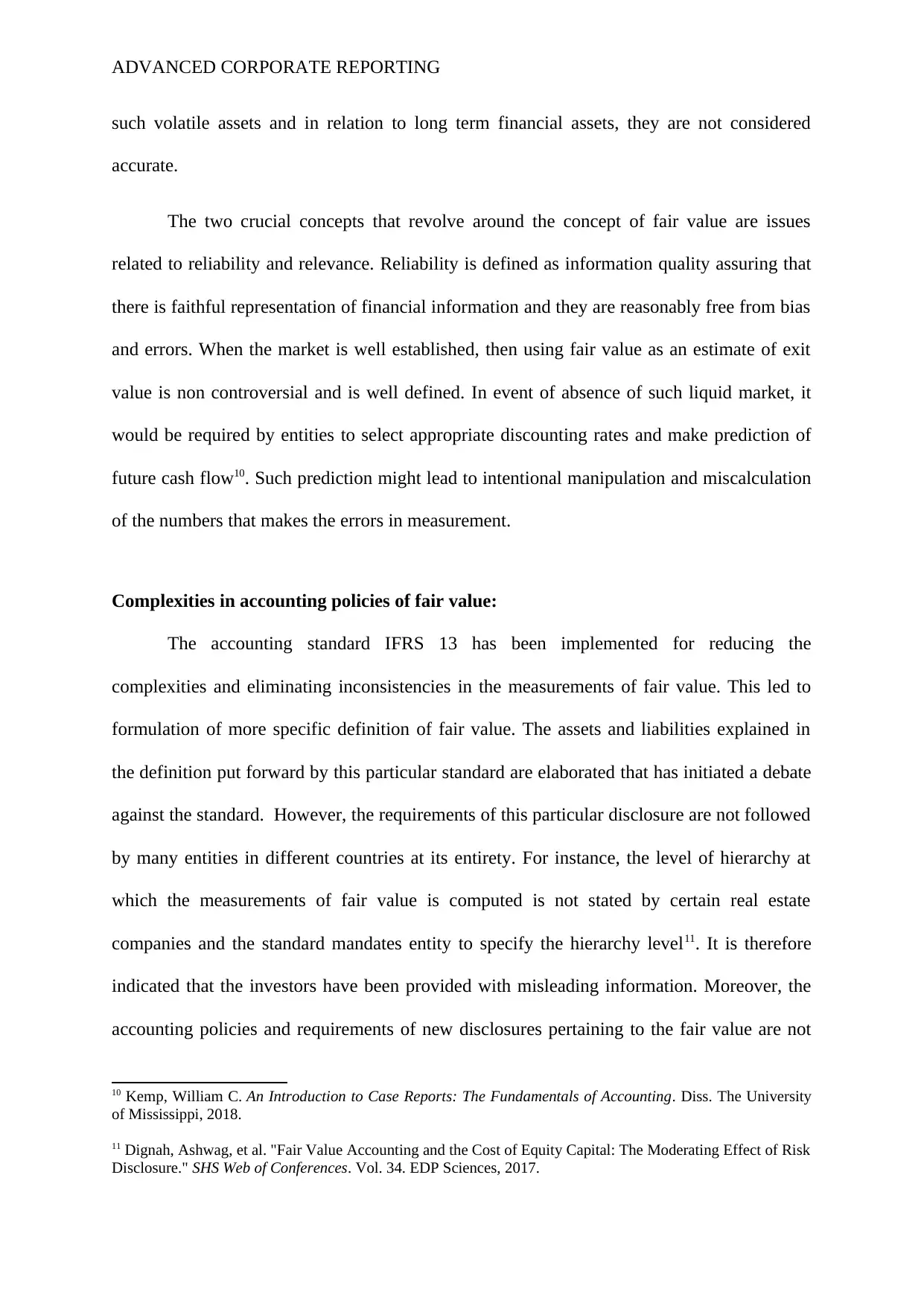
ADVANCED CORPORATE REPORTING
such volatile assets and in relation to long term financial assets, they are not considered
accurate.
The two crucial concepts that revolve around the concept of fair value are issues
related to reliability and relevance. Reliability is defined as information quality assuring that
there is faithful representation of financial information and they are reasonably free from bias
and errors. When the market is well established, then using fair value as an estimate of exit
value is non controversial and is well defined. In event of absence of such liquid market, it
would be required by entities to select appropriate discounting rates and make prediction of
future cash flow10. Such prediction might lead to intentional manipulation and miscalculation
of the numbers that makes the errors in measurement.
Complexities in accounting policies of fair value:
The accounting standard IFRS 13 has been implemented for reducing the
complexities and eliminating inconsistencies in the measurements of fair value. This led to
formulation of more specific definition of fair value. The assets and liabilities explained in
the definition put forward by this particular standard are elaborated that has initiated a debate
against the standard. However, the requirements of this particular disclosure are not followed
by many entities in different countries at its entirety. For instance, the level of hierarchy at
which the measurements of fair value is computed is not stated by certain real estate
companies and the standard mandates entity to specify the hierarchy level11. It is therefore
indicated that the investors have been provided with misleading information. Moreover, the
accounting policies and requirements of new disclosures pertaining to the fair value are not
10 Kemp, William C. An Introduction to Case Reports: The Fundamentals of Accounting. Diss. The University
of Mississippi, 2018.
11 Dignah, Ashwag, et al. "Fair Value Accounting and the Cost of Equity Capital: The Moderating Effect of Risk
Disclosure." SHS Web of Conferences. Vol. 34. EDP Sciences, 2017.
such volatile assets and in relation to long term financial assets, they are not considered
accurate.
The two crucial concepts that revolve around the concept of fair value are issues
related to reliability and relevance. Reliability is defined as information quality assuring that
there is faithful representation of financial information and they are reasonably free from bias
and errors. When the market is well established, then using fair value as an estimate of exit
value is non controversial and is well defined. In event of absence of such liquid market, it
would be required by entities to select appropriate discounting rates and make prediction of
future cash flow10. Such prediction might lead to intentional manipulation and miscalculation
of the numbers that makes the errors in measurement.
Complexities in accounting policies of fair value:
The accounting standard IFRS 13 has been implemented for reducing the
complexities and eliminating inconsistencies in the measurements of fair value. This led to
formulation of more specific definition of fair value. The assets and liabilities explained in
the definition put forward by this particular standard are elaborated that has initiated a debate
against the standard. However, the requirements of this particular disclosure are not followed
by many entities in different countries at its entirety. For instance, the level of hierarchy at
which the measurements of fair value is computed is not stated by certain real estate
companies and the standard mandates entity to specify the hierarchy level11. It is therefore
indicated that the investors have been provided with misleading information. Moreover, the
accounting policies and requirements of new disclosures pertaining to the fair value are not
10 Kemp, William C. An Introduction to Case Reports: The Fundamentals of Accounting. Diss. The University
of Mississippi, 2018.
11 Dignah, Ashwag, et al. "Fair Value Accounting and the Cost of Equity Capital: The Moderating Effect of Risk
Disclosure." SHS Web of Conferences. Vol. 34. EDP Sciences, 2017.
⊘ This is a preview!⊘
Do you want full access?
Subscribe today to unlock all pages.

Trusted by 1+ million students worldwide
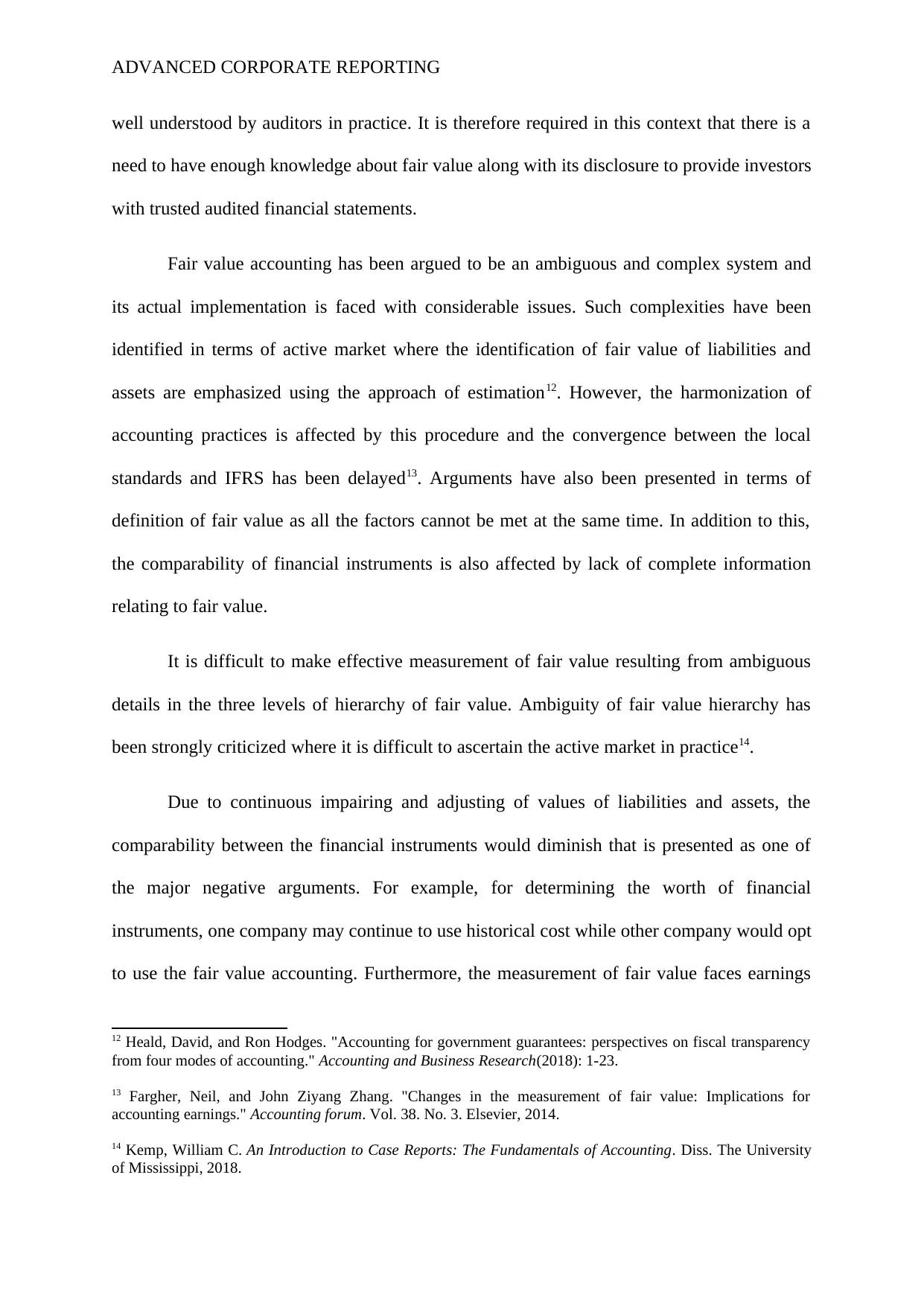
ADVANCED CORPORATE REPORTING
well understood by auditors in practice. It is therefore required in this context that there is a
need to have enough knowledge about fair value along with its disclosure to provide investors
with trusted audited financial statements.
Fair value accounting has been argued to be an ambiguous and complex system and
its actual implementation is faced with considerable issues. Such complexities have been
identified in terms of active market where the identification of fair value of liabilities and
assets are emphasized using the approach of estimation12. However, the harmonization of
accounting practices is affected by this procedure and the convergence between the local
standards and IFRS has been delayed13. Arguments have also been presented in terms of
definition of fair value as all the factors cannot be met at the same time. In addition to this,
the comparability of financial instruments is also affected by lack of complete information
relating to fair value.
It is difficult to make effective measurement of fair value resulting from ambiguous
details in the three levels of hierarchy of fair value. Ambiguity of fair value hierarchy has
been strongly criticized where it is difficult to ascertain the active market in practice14.
Due to continuous impairing and adjusting of values of liabilities and assets, the
comparability between the financial instruments would diminish that is presented as one of
the major negative arguments. For example, for determining the worth of financial
instruments, one company may continue to use historical cost while other company would opt
to use the fair value accounting. Furthermore, the measurement of fair value faces earnings
12 Heald, David, and Ron Hodges. "Accounting for government guarantees: perspectives on fiscal transparency
from four modes of accounting." Accounting and Business Research(2018): 1-23.
13 Fargher, Neil, and John Ziyang Zhang. "Changes in the measurement of fair value: Implications for
accounting earnings." Accounting forum. Vol. 38. No. 3. Elsevier, 2014.
14 Kemp, William C. An Introduction to Case Reports: The Fundamentals of Accounting. Diss. The University
of Mississippi, 2018.
well understood by auditors in practice. It is therefore required in this context that there is a
need to have enough knowledge about fair value along with its disclosure to provide investors
with trusted audited financial statements.
Fair value accounting has been argued to be an ambiguous and complex system and
its actual implementation is faced with considerable issues. Such complexities have been
identified in terms of active market where the identification of fair value of liabilities and
assets are emphasized using the approach of estimation12. However, the harmonization of
accounting practices is affected by this procedure and the convergence between the local
standards and IFRS has been delayed13. Arguments have also been presented in terms of
definition of fair value as all the factors cannot be met at the same time. In addition to this,
the comparability of financial instruments is also affected by lack of complete information
relating to fair value.
It is difficult to make effective measurement of fair value resulting from ambiguous
details in the three levels of hierarchy of fair value. Ambiguity of fair value hierarchy has
been strongly criticized where it is difficult to ascertain the active market in practice14.
Due to continuous impairing and adjusting of values of liabilities and assets, the
comparability between the financial instruments would diminish that is presented as one of
the major negative arguments. For example, for determining the worth of financial
instruments, one company may continue to use historical cost while other company would opt
to use the fair value accounting. Furthermore, the measurement of fair value faces earnings
12 Heald, David, and Ron Hodges. "Accounting for government guarantees: perspectives on fiscal transparency
from four modes of accounting." Accounting and Business Research(2018): 1-23.
13 Fargher, Neil, and John Ziyang Zhang. "Changes in the measurement of fair value: Implications for
accounting earnings." Accounting forum. Vol. 38. No. 3. Elsevier, 2014.
14 Kemp, William C. An Introduction to Case Reports: The Fundamentals of Accounting. Diss. The University
of Mississippi, 2018.
Paraphrase This Document
Need a fresh take? Get an instant paraphrase of this document with our AI Paraphraser
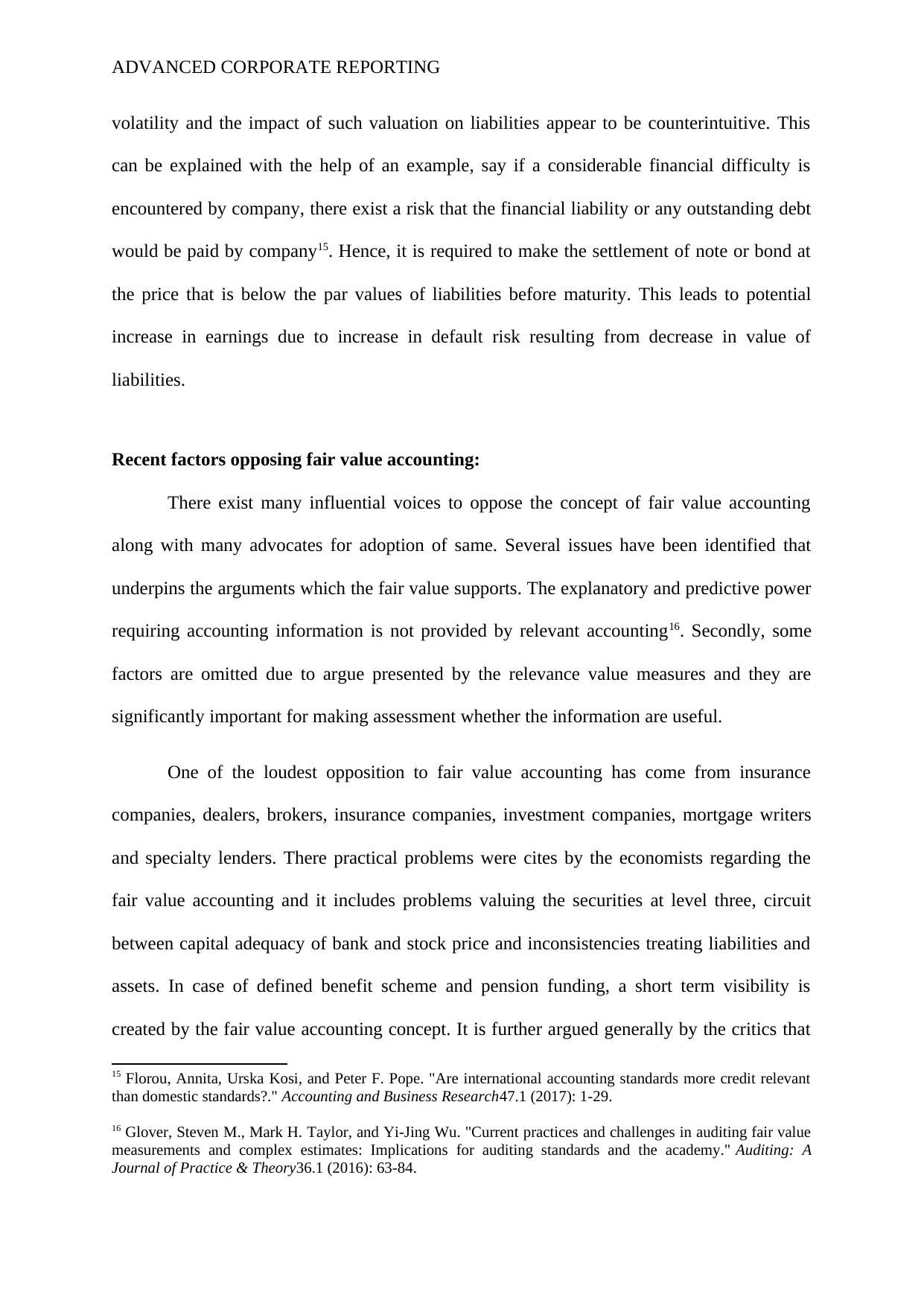
ADVANCED CORPORATE REPORTING
volatility and the impact of such valuation on liabilities appear to be counterintuitive. This
can be explained with the help of an example, say if a considerable financial difficulty is
encountered by company, there exist a risk that the financial liability or any outstanding debt
would be paid by company15. Hence, it is required to make the settlement of note or bond at
the price that is below the par values of liabilities before maturity. This leads to potential
increase in earnings due to increase in default risk resulting from decrease in value of
liabilities.
Recent factors opposing fair value accounting:
There exist many influential voices to oppose the concept of fair value accounting
along with many advocates for adoption of same. Several issues have been identified that
underpins the arguments which the fair value supports. The explanatory and predictive power
requiring accounting information is not provided by relevant accounting16. Secondly, some
factors are omitted due to argue presented by the relevance value measures and they are
significantly important for making assessment whether the information are useful.
One of the loudest opposition to fair value accounting has come from insurance
companies, dealers, brokers, insurance companies, investment companies, mortgage writers
and specialty lenders. There practical problems were cites by the economists regarding the
fair value accounting and it includes problems valuing the securities at level three, circuit
between capital adequacy of bank and stock price and inconsistencies treating liabilities and
assets. In case of defined benefit scheme and pension funding, a short term visibility is
created by the fair value accounting concept. It is further argued generally by the critics that
15 Florou, Annita, Urska Kosi, and Peter F. Pope. "Are international accounting standards more credit relevant
than domestic standards?." Accounting and Business Research47.1 (2017): 1-29.
16 Glover, Steven M., Mark H. Taylor, and Yi-Jing Wu. "Current practices and challenges in auditing fair value
measurements and complex estimates: Implications for auditing standards and the academy." Auditing: A
Journal of Practice & Theory36.1 (2016): 63-84.
volatility and the impact of such valuation on liabilities appear to be counterintuitive. This
can be explained with the help of an example, say if a considerable financial difficulty is
encountered by company, there exist a risk that the financial liability or any outstanding debt
would be paid by company15. Hence, it is required to make the settlement of note or bond at
the price that is below the par values of liabilities before maturity. This leads to potential
increase in earnings due to increase in default risk resulting from decrease in value of
liabilities.
Recent factors opposing fair value accounting:
There exist many influential voices to oppose the concept of fair value accounting
along with many advocates for adoption of same. Several issues have been identified that
underpins the arguments which the fair value supports. The explanatory and predictive power
requiring accounting information is not provided by relevant accounting16. Secondly, some
factors are omitted due to argue presented by the relevance value measures and they are
significantly important for making assessment whether the information are useful.
One of the loudest opposition to fair value accounting has come from insurance
companies, dealers, brokers, insurance companies, investment companies, mortgage writers
and specialty lenders. There practical problems were cites by the economists regarding the
fair value accounting and it includes problems valuing the securities at level three, circuit
between capital adequacy of bank and stock price and inconsistencies treating liabilities and
assets. In case of defined benefit scheme and pension funding, a short term visibility is
created by the fair value accounting concept. It is further argued generally by the critics that
15 Florou, Annita, Urska Kosi, and Peter F. Pope. "Are international accounting standards more credit relevant
than domestic standards?." Accounting and Business Research47.1 (2017): 1-29.
16 Glover, Steven M., Mark H. Taylor, and Yi-Jing Wu. "Current practices and challenges in auditing fair value
measurements and complex estimates: Implications for auditing standards and the academy." Auditing: A
Journal of Practice & Theory36.1 (2016): 63-84.
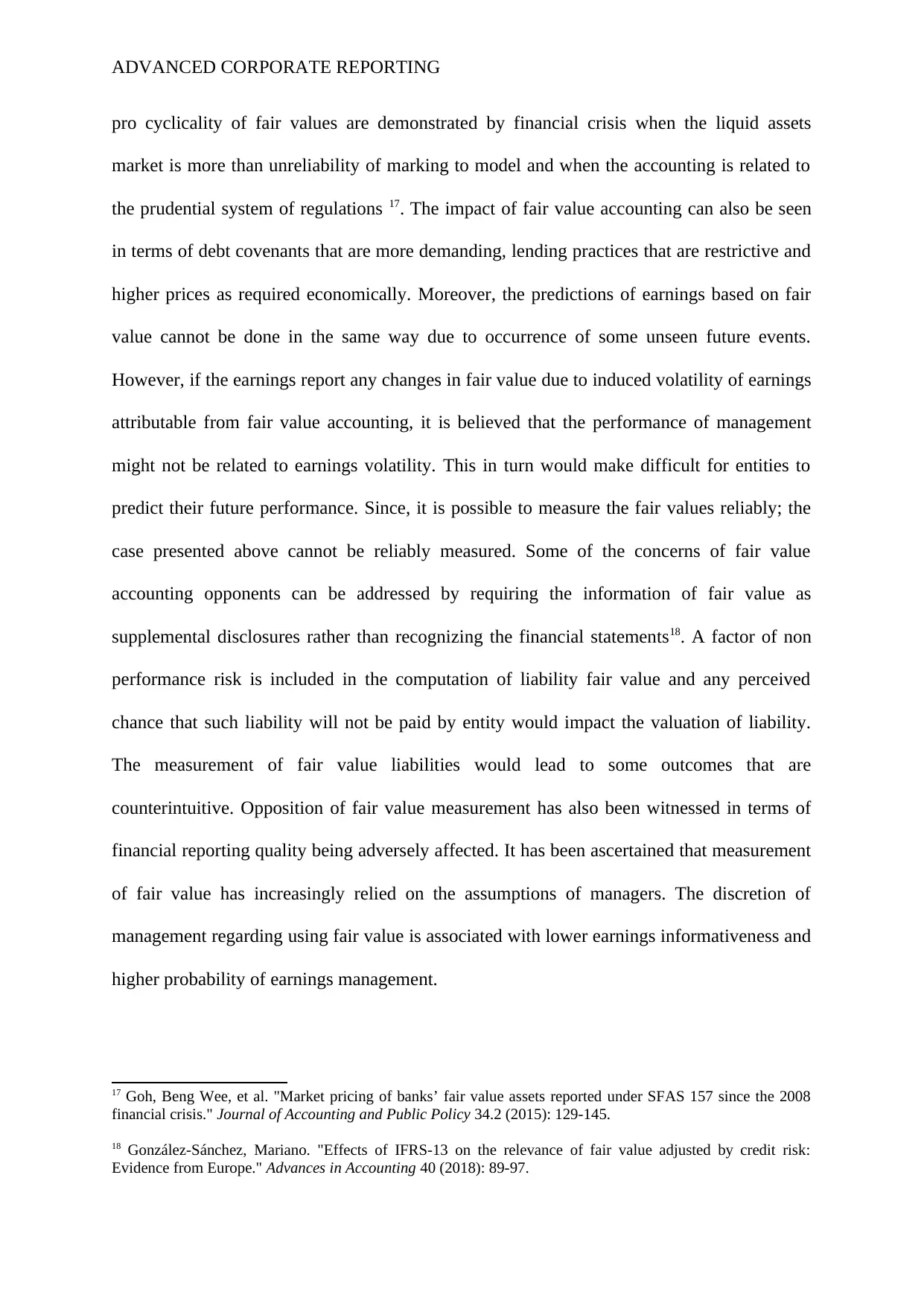
ADVANCED CORPORATE REPORTING
pro cyclicality of fair values are demonstrated by financial crisis when the liquid assets
market is more than unreliability of marking to model and when the accounting is related to
the prudential system of regulations 17. The impact of fair value accounting can also be seen
in terms of debt covenants that are more demanding, lending practices that are restrictive and
higher prices as required economically. Moreover, the predictions of earnings based on fair
value cannot be done in the same way due to occurrence of some unseen future events.
However, if the earnings report any changes in fair value due to induced volatility of earnings
attributable from fair value accounting, it is believed that the performance of management
might not be related to earnings volatility. This in turn would make difficult for entities to
predict their future performance. Since, it is possible to measure the fair values reliably; the
case presented above cannot be reliably measured. Some of the concerns of fair value
accounting opponents can be addressed by requiring the information of fair value as
supplemental disclosures rather than recognizing the financial statements18. A factor of non
performance risk is included in the computation of liability fair value and any perceived
chance that such liability will not be paid by entity would impact the valuation of liability.
The measurement of fair value liabilities would lead to some outcomes that are
counterintuitive. Opposition of fair value measurement has also been witnessed in terms of
financial reporting quality being adversely affected. It has been ascertained that measurement
of fair value has increasingly relied on the assumptions of managers. The discretion of
management regarding using fair value is associated with lower earnings informativeness and
higher probability of earnings management.
17 Goh, Beng Wee, et al. "Market pricing of banks’ fair value assets reported under SFAS 157 since the 2008
financial crisis." Journal of Accounting and Public Policy 34.2 (2015): 129-145.
18 González-Sánchez, Mariano. "Effects of IFRS-13 on the relevance of fair value adjusted by credit risk:
Evidence from Europe." Advances in Accounting 40 (2018): 89-97.
pro cyclicality of fair values are demonstrated by financial crisis when the liquid assets
market is more than unreliability of marking to model and when the accounting is related to
the prudential system of regulations 17. The impact of fair value accounting can also be seen
in terms of debt covenants that are more demanding, lending practices that are restrictive and
higher prices as required economically. Moreover, the predictions of earnings based on fair
value cannot be done in the same way due to occurrence of some unseen future events.
However, if the earnings report any changes in fair value due to induced volatility of earnings
attributable from fair value accounting, it is believed that the performance of management
might not be related to earnings volatility. This in turn would make difficult for entities to
predict their future performance. Since, it is possible to measure the fair values reliably; the
case presented above cannot be reliably measured. Some of the concerns of fair value
accounting opponents can be addressed by requiring the information of fair value as
supplemental disclosures rather than recognizing the financial statements18. A factor of non
performance risk is included in the computation of liability fair value and any perceived
chance that such liability will not be paid by entity would impact the valuation of liability.
The measurement of fair value liabilities would lead to some outcomes that are
counterintuitive. Opposition of fair value measurement has also been witnessed in terms of
financial reporting quality being adversely affected. It has been ascertained that measurement
of fair value has increasingly relied on the assumptions of managers. The discretion of
management regarding using fair value is associated with lower earnings informativeness and
higher probability of earnings management.
17 Goh, Beng Wee, et al. "Market pricing of banks’ fair value assets reported under SFAS 157 since the 2008
financial crisis." Journal of Accounting and Public Policy 34.2 (2015): 129-145.
18 González-Sánchez, Mariano. "Effects of IFRS-13 on the relevance of fair value adjusted by credit risk:
Evidence from Europe." Advances in Accounting 40 (2018): 89-97.
⊘ This is a preview!⊘
Do you want full access?
Subscribe today to unlock all pages.

Trusted by 1+ million students worldwide
1 out of 20
Related Documents
Your All-in-One AI-Powered Toolkit for Academic Success.
+13062052269
info@desklib.com
Available 24*7 on WhatsApp / Email
![[object Object]](/_next/static/media/star-bottom.7253800d.svg)
Unlock your academic potential
Copyright © 2020–2026 A2Z Services. All Rights Reserved. Developed and managed by ZUCOL.





